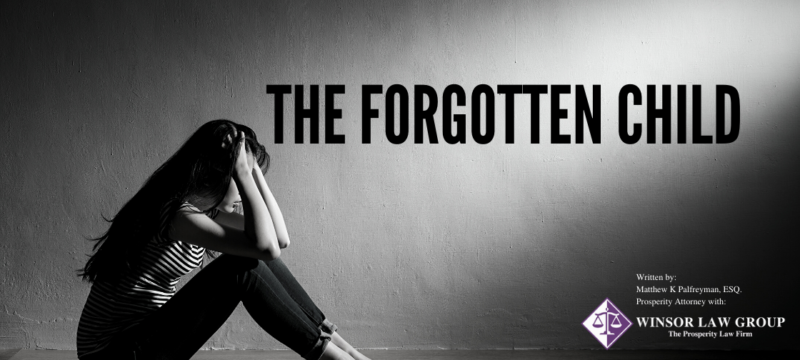
The Forgotten Child
- November 6, 2019
- Admin
- Comments Off on The Forgotten Child
By: Matthew K Palfreyman, Esq.
It is amazing how fast life moves on after the crazy bustle of Halloween ends. Stores change decorations almost in an instant, and parents go right back to work after a night of fun, candy, and small scares. Sometimes home decorations or activities make a real impression on me that last long beyond the holiday. A probate call I received a few years earlier made that kind of an impression on me. It is a real-life horror story for sure.
The caller identified herself as the step-daughter of a man who had recently passed away from an unexpected heart attack. The caller was a young girl in her mid-twenties, and had been living with, and caring for, her step-father for several years. The girl described her step-father as a very kind man, who had been completely abandoned by his biological children, but who had raised her as a child prior to her mother’s divorce. In a very meaningful way to the caller, the man had assumed the role of her father during, and even after the divorce. He provided her with a home while she was studying for college; he had also bought and insured her car for her. Yet even more, her father was a small business owner and she worked for him to make money to pay for school and other living expenses.
As an estate attorney, I saw where the call was going as she went on to describe what was happening to her; how an attorney she never heard of was calling and sending her letters at home telling her to move out immediately. I stopped her mid-sentence, and confirmed what I suspected, “Your step-father did not have a will, did he?” “No, and I am not sure what this all means.” My gut sank, as I knew exactly what was coming. It was exactly what she had suspected and feared.
Sure enough, her Step-father’s biological children had opened probate and were beginning to take control of their father’s estate. The biological children were legally entitled to all of it, the house, the car, and the business. Step-children are not considered legal heirs under state law. We spent the next several minutes trying to figure out her options, pulling at strings to try and salvage anything. However, the fact remained that her entire life was going to be pulled out from under her.
Even very good people can make very serious mistakes. There are formalities in the law for creating wills, but those formalities are there to give the document stronger weight as evidence of what the deceased wants in probate court; the creation of formalities do not make the will as a document any more or less valid.
A will can simply be scribbled on a napkin without the assistance of attorneys. It is not great, but it is sufficient to demonstrate the critical question of the deceased person desire and intent. Any piece of paper signed by her step-father that said in effect, “if I die my property goes to my step-daughter and not to my biological children,” would have fundamentally changed everything for the caller. While it may not have been easy or cheap for her claim the inheritance with a napkin as a last will and testament, it would have at least given her the upper hand against her step-siblings in the coming probate court battle.
This real-life horror story is not a story of legal or moral injustice. For what happened to be considered an injustice, the step-daughter needed to have a basic set of legal rights to the property, something which her step-father did not give her. All this story can ever be is a real-life cautionary tale of parental ignorance or indifference. Everyone needs estate planning, parents and non-parents alike. Most, if not all, need at least a will. Most, if not all, need much more than a will.
*The information provided in this article is of a general nature and reflects only the opinion of the author at the time it was drafted. It is not intended as definitive legal advice, does not create an attorney-client relationship, and you should not act upon it without seeking independent legal counsel.
